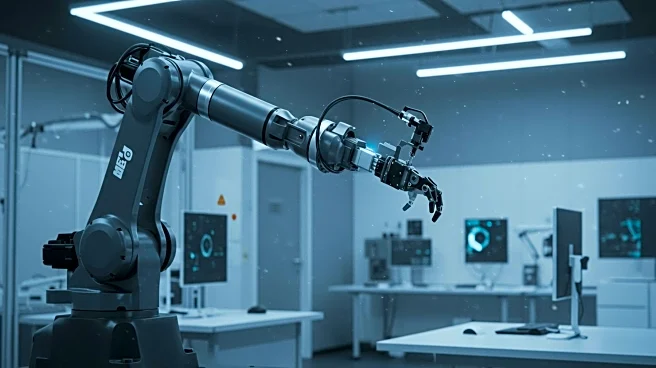What's Happening?
Agentic AI is emerging as a transformative force in workplaces, capable of performing complex tasks autonomously. This technology is likened to a wind-up toy that, once set up, can operate across multiple platforms and processes without human supervision. It is being integrated into various organizational functions, from approving expenses to managing customer experiences. Major tech firms, including OpenAI, have launched tools like ChatGPT agent, designed to analyze and summarize information autonomously. Despite the excitement, only a small percentage of companies have fully implemented AI strategies, indicating that the adoption of agentic AI is still in its early stages. Research suggests that the use of agentic AI will increase significantly in the coming years, although there is skepticism about its current capabilities and the hype surrounding it.
Why It's Important?
The integration of agentic AI into workplaces has the potential to significantly alter the nature of work, reducing repetitive tasks and allowing employees to focus on creative and strategic activities. This shift could enhance organizational efficiency and innovation. However, it also raises concerns about job displacement and privacy, as AI systems often require access to vast amounts of data. The technology's ability to operate autonomously could disrupt traditional organizational structures, potentially replacing human roles in certain areas. As companies invest heavily in AI development, the pressure to realize returns on these investments is mounting, driving the rapid implementation of agentic AI despite its current limitations.
What's Next?
As agentic AI continues to evolve, companies are likely to increase their investment in this technology, seeking to balance the costs of research and development with practical applications. The focus will be on refining AI systems to minimize errors and enhance their reliability. Organizations may need to adapt their structures and processes to accommodate AI-driven workflows, potentially leading to a reevaluation of job roles and responsibilities. The ongoing development of AI will require careful management to ensure ethical use and to address concerns about data privacy and security.
Beyond the Headlines
The rise of agentic AI presents ethical and cultural challenges, particularly in terms of trust and the human-AI relationship. As AI systems become more integrated into daily work, there is a risk of misplaced trust, where users may overestimate the capabilities of AI. This could lead to reliance on technology that is not yet fully reliable, necessitating a cautious approach to its implementation. The distinction between human and technological trust is becoming increasingly blurred, prompting discussions about the long-term implications of AI in society.










